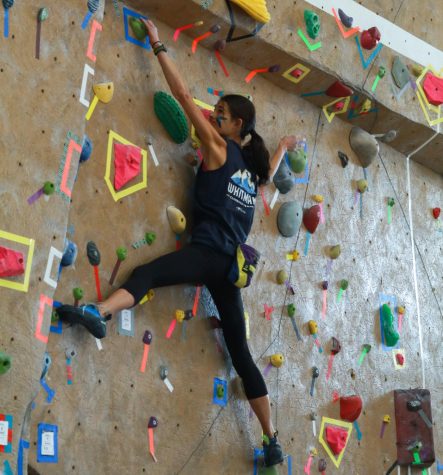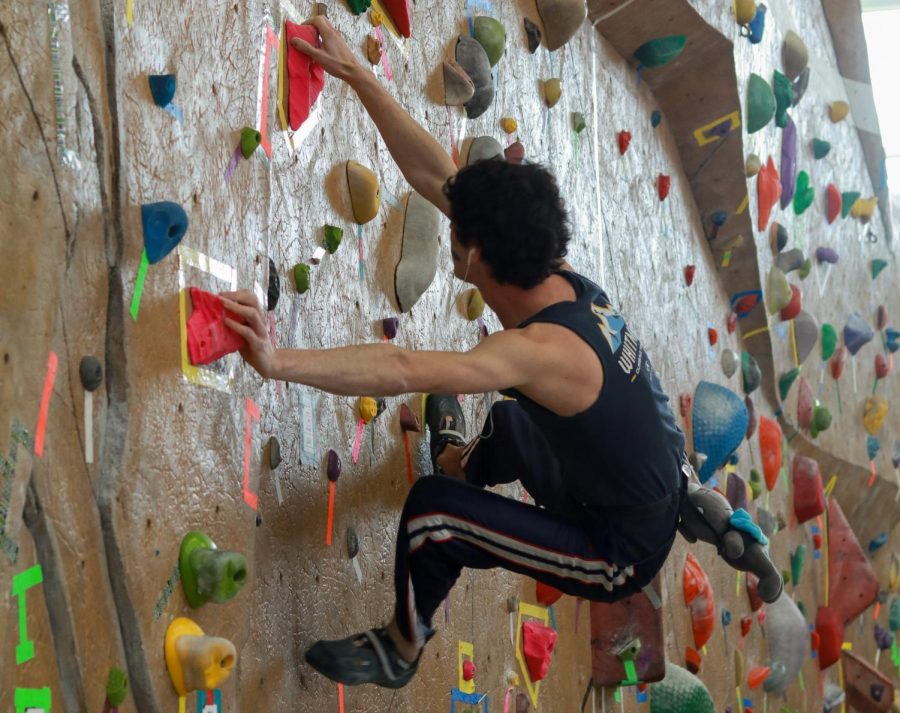Students rock bouldering competition
Whitman Climbing Team members dominated final rounds of SRC’s yearly Pullman Pulldown event
OLIVER MCKENNA | THE DAILY EVERGREEN
NoahLani Litwinsella, climber for the Whitman Climbing Team, eyes the wall as he plans his next move during the Pullman Pulldown bouldering competition Saturday afternoon in the Student Recreation Center. He finished the first route on his first attempt.
April 1, 2018
Raquel Peterson and NoahLani Litwinsella, both of the Whitman Climbing Team, have been climbing since their early teens. This could explain why they placed first in Pullman Pulldown, an annual bouldering competition hosted by University Recreation.
The competition was held this past Saturday at the climbing wall in the Student Recreation Center from 10 a.m. to 5 p.m. The event started with two heats, during which all climbers and their teams could climb the different color-coded routes.
Ira Litushko, a WSU sophomore and SRC employee who helped set up the routes, said points were awarded to climbers if they finished a route and had it signed off by an employee. If they did the route on their first try without falling, the climber was awarded an extra 50 points.
“I like watching climbers, especially when they climb harder routes,” Litushko said. “You can tell it gets really intense for them.”
The second heat ended at 2:30 p.m., when all climbers had to submit their signed point cards to the SRC employees, who took the top three male scores and top three female scores. These were the finalists, who would then climb three separate, more difficult routes.
The three male finalists were Litwinsella, Isaac Cook and Colby Kramer. For women, the top three scores went to Peterson, Mackenzie Kuller and Alli Probst. After they were announced, the climbers were directed to leave the area while Litushko and other SRC employees prepared the climbs. They themselves climbed the wall to tighten screws and tape the selected routes.
Litushko said the climbers would have a chance to see the routes before climbing, especially since they would be penalized more heavily for falling than during the heats.
Though all six climbers were clearly competent and only fell a few times while navigating the three routes, Peterson managed to finish the first route, while Probst and Kuller came close. Cook and Kramer displayed the upper body strength required to reach across the wider holds, but Litwinsella was the only male able to finish the first route without falling.
The third route was clearly the most challenging for all six climbers — none managed to finish without falling at least once, dangling as they swung from hold to hold on the tilted climbing wall.
Litwinsella said he wasn’t interested in climbing at all when he first did it. He was terrified of heights, but his mother convinced him to participate in a competition when he was younger.
“I was climbing and I guess I made it the furthest of everyone that was climbing,” Litwinsella said. “I asked the instructor to bring me down but he said he wouldn’t until I made it to the top.”
Trapped in a harness that was digging into his skin, Litwinsella decided to finish the climb. Since then, he said the constant challenges of climbing propelled him into the athletic hobby.
Peterson began climbing around six years ago. She said she did it competitively for a while in high school and always had a passion for it. The SRC climbing wall is ideal, she added, because the employees are able to set up a number of different and challenging routes for the climbers, even though the wall is smaller than what she’s used to.

Raquel Peterson of the Whitman Climbing Team won the female bouldering competition.
“My favorite part [of climbing] is definitely the variety,” Peterson said. “It’s always changing, unlike other sports.”
Though Litwinsella and Peterson were able to choose from a table of prizes, which included tank tops, stickers, hats and climbing ropes from UREC sponsors, other finalists were not upset about their second and third place titles.
Kramer said he began climbing four years ago and was just excited he made it to the finals since it was his first time. He said the best part of climbing for him remains the tight-knit community he belongs to. This rang true during the competition — after finalists were announced, other climbers pulled their chairs to the very front of the wall and cheered loudly for their friends as they climbed.
“It’s just good to challenge yourself,” Kramer said, pausing in his discussion with Litwinsella about the routes they had just climbed alongside each other.
Even during the heat, Litushko said the point system was honor-based. Because the wall was teeming with climbers, SRC employees couldn’t keep track of everyone who fell or didn’t finish a route. In this way, the climbers were very much responsible for themselves. The competition allowed climbers to challenge themselves with new and different routes while also getting to hang out with each other.











